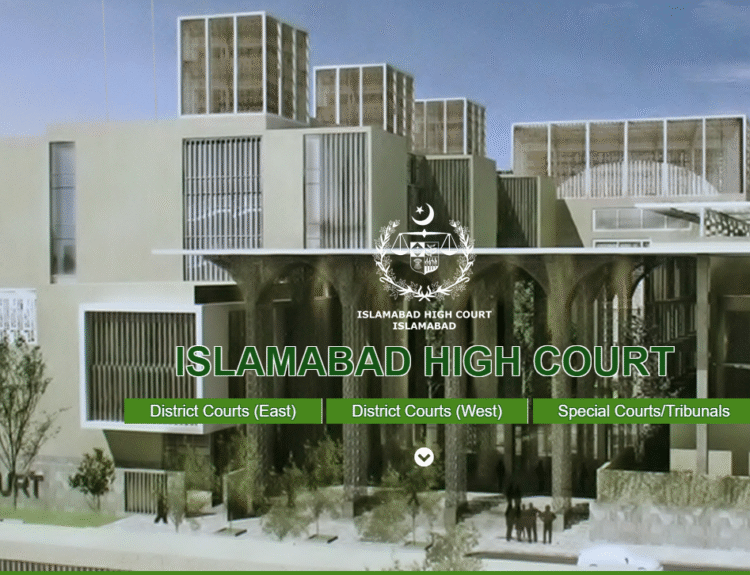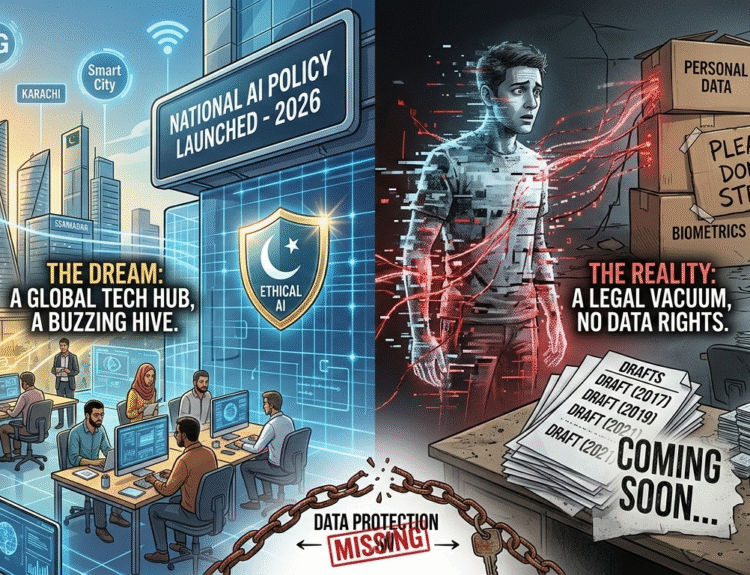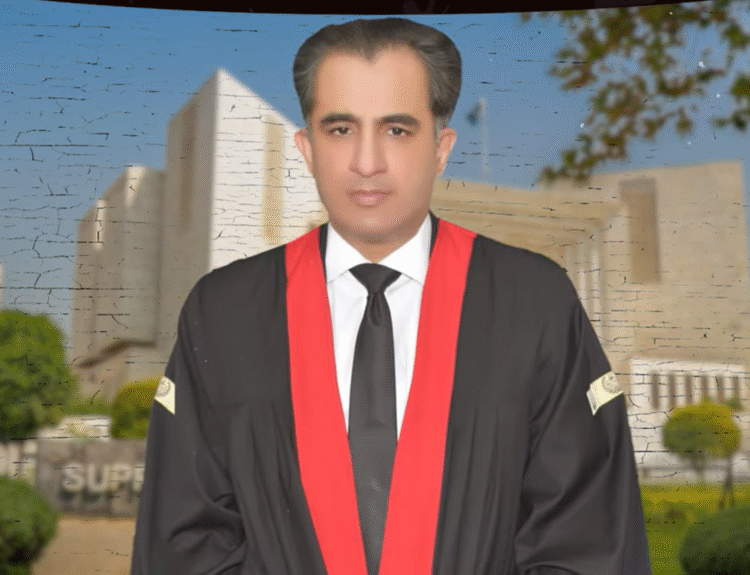Khudayar Mohla –
While speaking to full court reference in honour of retiring Chief Justice Mian Saqib Nisar Thursday the Chief Justice-designate Justice Sardar Asif Saeed Khan Khosa expressed that suo-moto powers would be exercised rarely.
All the Supreme Court judges except Justice Mansoor Ali Shah who recently wrote a note of dissent against Chief Justice Mian Saqib Nisar’s decision of dissolving a bench in Peshawar, President Supreme Court Bar Association Amanullah Kanrani, Attorney General of Pakistan Anwar Mansoor, advocate generals of all provinces, representatives of bar associations, judges of high court, civil judges and media persons also attended the full court reference.
On the occasion, Justice Khosa expressed commitment to take steps in best interest of judiciary saying, I would like to assure you that all such steps will be taken in the best interest of the institution of judiciary and that in all manner of circumstances we shall like and prefer to be correct rather than erratic and proper rather than popular”.
Justice Khosa said in his address, “Suo motu exercise of this Court’s jurisdiction under Article 184(3) of the Constitution shall be exercised very sparingly and only in respect of larger issues of national importance where either there is no other adequate or efficacious remedy available or the available constitutional or legal remedies are ineffective or are rendered incapacitated”.
He further expressed that either through a full court meeting or through a judicial exercise an effort shall be made to determine and lay down the scope and parameters of exercise of the original jurisdiction of the Supreme Court under Article 184(3) of the Constitution. “If deemed appropriate, to carve out the scope of an intra-court appeal in such matters through an appropriate amendment of the Supreme Court Rules or to suitably amend the provisions relating to review jurisdiction so as to enlarge its scope in such cases”, Justice Khosa said.
While pointing out issues in justice sector he expressed, “I am conscious that the issues being faced by the justice sector are gigantic but I may assure you that no stone shall be left unturned in attending to such issues and in trying to improve the situation. With Baloch blood running in my veins I shall fight till the end and I am confident that with the support and cooperation of my colleagues and the Bar the struggle shall bear fruit.”
About dispensation of justice he assured that he will leave no stone unturned saying he will avail “every moment” of his remaining time on the bench “to attend to the causes that contribute towards delay in disposition of cases at all levels of the judicial hierarchy.
“With an untiring effort of my colleagues having expertise on the criminal side we have already succeeded in deciding thousands of criminal cases and in wiping out the backlog of such cases in this [SC] court and we are now left with only a few hundred pending criminal cases which can be termed as current cases.”
Expressing about retiring Chief Justice Mian Saqib Nisar temptation to build dams and to retire national debt, Justice Khosa said, “I would also like to build some dams, a dam against undue and unnecessary delays in judicial determination of cases, a dam against frivolous litigation and a dam against fake witnesses and false testimonies and would also try to retire a debt, the debt of pending cases which must be decided at the earliest possible.”
Talking about pendency of cases in the courts, Justice Khosa said, “There are about 1.9 million cases pending in the country before all the courts put together and to handle such a huge number of cases there are only about 3000 judges and magistrates available from top to bottom.”
He said the criticised governments for failing to increase the number of judges and magistrates. “3000 judges and magistrates cannot handle 1.9 million cases even if they work for 36 hours a day.”
Justice Khosa further said that it was time to redesign the judicial system as a whole and make it simple and effective, adding, “The four-tier judicial hierarchy in the country ought to be replaced with a three-tier system wherein there should be the district judiciary as the trial court for all civil and criminal cases, the provincial high courts as the courts of appeal in all cases and the Supreme Court as the last resort.”
Justice Khosa said the special courts “ought to be abolished” and fitted into the three-tier system.
“Military Courts trying civilians in criminal cases are universally perceived as an aberration propelled by necessity and expediency. If the legislature, in its own wisdom, decides to continue with such courts for the time being then it may consider providing for appeals from their decisions to lie before a high court so as to adjust such courts in the normal judicial hierarchy and to ensure that expediency does not trump justice,” said Justice Khosa.
He maintained that shorter formats of judgments and orders will be introduced to ensure no time is wasted in “writing unnecessary details”.
Highlighting civilian supremacy, Justice Khosa shed light on the prevailing trust deficit between institutions saying, “Every organ has reasons for sticking to its declared position. There is no gainsaying that all the three organs of the State, i.e. the Legislature, the Judiciary and the Executive are always to strive hard for exercising their powers and performing their functions to the best of their abilities while maintaining their independence and operational autonomy but at the same time when it comes to steering the ship of the State and handling the larger national issues all such organs are to work in tandem in finding solutions which advance the spirit and purposes of the Constitution.”
“In my humble estimation time has come when we should put our heads together and in the spirit of truth and reconciliation discuss the larger issues jeopardizing good governance”, Justice Khosa expressed.
“Let us discuss how the executive authorities and departments are to be kept operationally autonomous in administrative matters while implementing the policies of the political executive so as to ensure good governance, Let us also discuss, without mincing words or feeling shy, the role of the armed forces and the intelligence agencies in the governance paradigm,” Justice Khosa stressed.
“Noting that civilian supremacy and civilian accountability were sine qua non for democratic sustainability”, Justice Khosa urged to ensure a process that did not destabilise democracy.
Justice Khosa highlighted the issue of missing persons and enforced disappearance and their ‘adverse impact upon the constitutional scheme of things as well as national cohesion.”
“It needs to be realised and appreciated by all the stakeholders that statecraft is too serious a business to be reduced to a game of hide and seek and that in a constitutional democracy national security cannot be pursued by employing methods which are offensive to the constitutionally guaranteed fundamental rights to life and liberty”, Justice Khosa said.
He further said, “Instead of adopting a trigger-happy approach or a devil may care attitude on these delicate and sensitive issues we need to find solutions from within the Constitution and the law.”
Expressing over the court’s suo moto power, Justice Khosa said it was time to “reflect upon the past, learn from the mistakes and to define the future course of action with clarity lest the rudderless ship may be swept away by the storm of unbridled emotions and selfish short-sightedness.”
“Let us not shy away from all such critical issues or look the other way in careless abandon and let us catch the bull by its horns if we want to make any progress as a forward looking and democratic nation governed by a Constitution,” Justice Khosa expressed.
“Let us call a spade a spade,” he emphasised.
To combat said issues, Justice Khosa proposed an “inter-institutional dialogue at the summit level.” He opined that the country had reached a stage where it must take stock of “mistakes committed in the past and to come up with a Charter of Governance so as to ensure that such mistakes are not repeated in future.”
During his speech, Justice Khosa asked President Dr. Arif Alvi to convene a summit where the top parliamentary, judicial, executive leaderships including military and intelligence agencies were in attendance. He said that the summit would work out a “practicable policy framework under which every organ and institution of the State would exercise its powers and perform its functions within its constitutionally defined limits.”
Justice Khosa urged to discuss “where the judiciary, the executive and the legislature have gone wrong in the past”.
“Let us discuss where each other’s domain has been encroached upon in the past and try to resolve such issues through a mutually agreed course of action,” he said.
Justice Khosa also urged to debate “the alleged encroachment of the executive domain by the judiciary through interference in matters of policy”.
Justice Khosa proposed working on restricting legislative body to its domain rather than encroaching upon the executive domain through development funds and through interference in appointment, posting, transfer or promotion of public servants which is the main breeding ground for misuse of authority, corruption, lack of merit, inefficiency and the resultant bad governance.”
Suggesting to legislature to repeal unnecessary laws Justice Khosa said, “It shall be suggested to the legislature that such unnecessary or problematic laws ought to be repealed or suitably amended and in case of failure of the legislature to attend to the said issue such laws may be judicially scrutinized.”
He further said, “There are also some issues of public importance with reference to enforcement of fundamental rights of the citizens which have hitherto remained unattended and an effort shall be made to attend to those issues in all earnestness within the shortest possible time.”
Giving hint for application of modern technology in administration of justice he said, “For facilitation of the learned counsel and in order to minimise the chances of adjournments modern technology shall be utilized and a possibility shall be explored regarding establishing video links between the branch registries of the apex court and the principal seat through which the learned counsel may address arguments in the courtrooms of the branch registries and appropriate benches of SC may hear those arguments at the principal seat in real time and decide cases.”
Justice Khosa described himself and Justice Mian Saqib Nisar as “conjoined twins for the last twenty years and eight months”.
“In the medical jargon conjoined twins are twins whose bodies are connected to each other and it is through a very complicated surgical intervention that such twins may be separated,” Justice Khosa said.
“Mian sahib and I were elevated to the bench of the Lahore High Court together on May 21, 1998, we were deposed together on November 03, 2007, we were restored together on August 30, 2008 and we were elevated to the bench of this court together on February 18, 2010”, Justice Khosa informed.
Justice Khosa said, “Alas, by the stroke of midnight tonight these twins shall stand separated physically not through any surgical intervention but through a constitutional intervention and I must hasten to add that the loss through such separation shall be entirely mine.”
“I have found Mian sahib’s mastery over civil, tax, revenue, service and constitutional law enviable and difficult to match… I have no hesitation in acknowledging that Mian sahib will go down in history as one of those chief justices who steered the apex court quite ably in testing times.”
“The saga of the Panama Papers, the issues of constitutional disqualification of political leaders, the events leading to holding of the general elections in the country and the issues arising out of the national effort against terrorism, extremism, corruption and poor governance posed huge challenges but Mian sahib was able to wade through all those troubled waters and to steer the ship of this court to safe and still waters.”
“Despite his preoccupation with such larger national issues, he also devoted his attention to many issues of public importance regarding the citizens’ fundamental rights, Justice Khosa concluded.
Categories
Uncategorized



